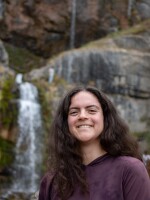Día de los Muertos, or Day of the Dead, is a holiday for remembering and honoring family members and ancestors who have died. Celebrated in Mexico and other parts of Latin America, it is a cheerful occasion, not scary like Halloween. But for Kyron Teague, an eleventh grade trumpet player at Ogden’s Ben Lomond High School, performing in his first mariachi concert got off to a spooky start.
“It was horrifying” in the beginning, but by the second song, he said he felt more comfortable.
His class, along with other students and professional ensembles, played at the Oct. 12 Día de los Muertos festival put on by Ogden Friends of Acoustic Music. The nonprofit promotes traditional and contemporary music.
Board member Arlene Anderson, who’s also vice president of the Ogden School Board, helped launch the festival three years ago because she wanted Hispanic and Latino students to feel they belong.
As a child of Mexican immigrants, Anderson felt she had to hide part of her culture while attending Ogden schools in the ‘70s and ‘80s.
“Just trying to connect with others that didn't look like me, didn't sound like me, was very difficult growing up,” she said, noting she knew few other students of color.

Ogden schools are different now. They’ve been at least 50% Hispanic since 2014. Things aren’t perfect, but Anderson said Hispanic and Latino students have “been able to embrace just even speaking Spanish when they need to, and sharing more of the holidays and the culture and the traditions.”
And this year, for the first time, some Ogden schools offer mariachi classes.
The group from Ben Lomond stood onstage at the festival between two towering skeletons. They held guitars, violins, trumpets and a guitarrón — a deep-bodied acoustic bass.
A few signed up for the mariachi class to get better at an instrument or learn a new genre. Others, like Teague, joined to connect with their culture. He learned to play music related to his Mexican heritage, which he said he grew up disconnected from.

“Singing the songs in Spanish in class and stuff like that also helped me get more comfortable with speaking Spanish [with] my family,” he said.
The class has also helped him connect with other students.
Dancing before the show with a fellow trumpet player made him realize “there's actually kids out there who do understand” his experience, he said. “It does feel very reassuring and reaffirming.”
That fellow musician, sophomore Vanessa Hernandez, picked up the trumpet for the first time at the start of this school year. Her father and grandfather both played in mariachi groups, so it’s “in my blood,” she said.
Her dad helped her practice in Spanish with the Do, Re, Mi note system instead of A, B, C as she learned in school. To minimize confusion, she said music teacher Daniel Tracy has started instructing her in Spanish, too.
“It makes me happy to know that I'm engaging in things that are in my roots and that other people are engaging in as well,” she said.

Fifteen-year-old Emma Almanza of West Haven also took to the festival stage to perform mariachi. Her great-grandmother was a singer like her, she said, and she wanted to show the crowd that she was carrying on traditions.
“Even though, you know, our parents are the ones who came from Mexico, our parents are the ones who really lived through it, we're still learning from it, and we're still wanting to keep our raíces with us,” she said.
Sometimes she displays those raíces, or roots, with big, flowery dresses. For her performance, she picked a maroon, gold and white skirt with a matching jacket and wide sombrero.
“When people look at me, they're not going to think, ‘Oh, it's a girl singing.’ They're going to think, ‘Oh my gosh, it's a girl representing her roots,’” she said.
After singing at Día de los Muertos last year, someone from the crowd thanked her. He told her she helped him “feel so connected to [his] ancestors and [his] family members,” she recalled.
At this year’s celebration, attendees paraded around the block with photos of loved ones and then added them to a prominent altar. On four rows of tables, framed portraits sat among candles, skulls and orange paper flowers.

Teague thought of his grandpa, who was ill and couldn't make the performance. He reflected on how his ancestors came from different countries, paving the way for him to honor their heritage. At the amphitheater, he felt he could celebrate his culture without fear of judgment.
“I feel like that first stretch when you have in the morning,” he said, taking a deep breath, “where you're just like, mi familia,” he laughed. “It just feels very nice and happy.”
As she organized the event, Anderson also thought of those who came before — more specifically, her parents.
“Everything I do, I believe, is for them, and I wish they were still here to see [how] I'm doing my best to pay it forward,” she said.
Macy Lipkin is a Report for America corps member who reports for KUER in northern Utah.





